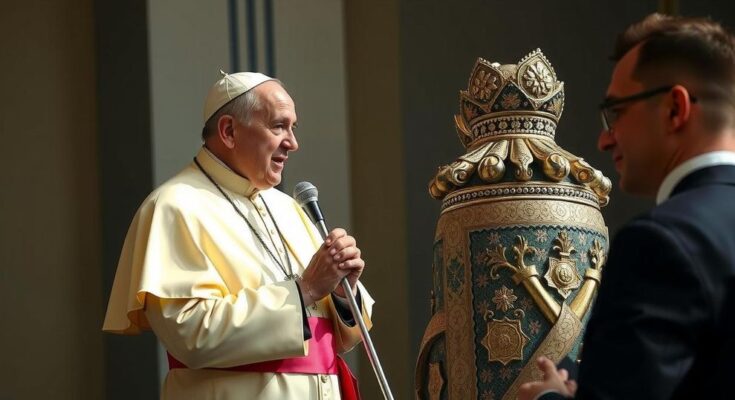Pope Francis’ promotion of interreligious dialogue finds significant resonance in Kazakhstan, particularly demonstrated through recent congresses in Astana where diverse religious leaders unite to foster mutual understanding. Kazakhstan’s commitment to peace, historically marked by its renunciation of nuclear arms, reinforces its role as a mediator in global conflict and dialogue initiatives. This relationship with the Vatican highlights a shared vision of solidarity, as both parties work towards addressing pressing global challenges through constructive conversations.
Pope Francis’ advocacy for interreligious dialogue, aimed at fostering global solidarity and peace, manifests strongly in Kazakhstan, a nation predominantly founded on Islamic beliefs. Notably, the recent interreligious congress in Astana exemplifies this commitment, with leaders from various faiths convening to promote understanding and acceptance. Despite the church’s minority status in Kazakhstan, the Vatican actively engages with Kazakh authorities to advance the joint vision for a harmonious global society, reflecting a mutual dedication that transcends religious divides. As Kazakhstan positions itself as a hub for dialogue, the country exemplifies the ideals championed by Pope Francis, striving for collective peace efforts amid existing geopolitical tensions in surrounding regions.
The Catholic Church, under Pope Francis, has consistently underscored the significance of global peace and interfaith discussions during his papacy. In Kazakhstan, a country with a rich tapestry of ethnic and religious diversity, this vision has taken tangible form illustrated by the 22nd session of the Congress of World Leaders and Traditional Religions. Historically, Kazakhstan has leveraged its unique position and peaceful foreign policy to foster interreligious dialogue, even renouncing its substantial nuclear arsenal to promote disarmament and security. The recent dialogue initiatives, including the upcoming ambassadorial appointments, highlight Kazakhstan’s strategic role as a mediator in international relations, further reinforced by their commitment to interreligious dialogue framed as “spiritual diplomacy.”
Kazakhstan’s diverse religious landscape includes 120 ethnic groups and around 4,000 religious organizations, creating a culturally rich environment ideal for promoting interfaith cooperation. This commitment is not without its challenges; the legislative framework regulating religion in Kazakhstan—though intended to prevent extremism—has drawn criticism for potential infringements on religious freedoms. Yet, the country’s dedication to the principles of dialogue continues to flourish, nurturing interfaith relations that align with the teachings of the Catholic Church. The consistent involvement of Catholic representatives in Kazakhstan’s interreligious summits underscores a growing partnership that contributes to both local and global dialogue efforts.
As Ambassador Kairat Sarzhanov articulated, “Kazakhstan shares the global vision of the Catholic Church, which is rooted in the ideals of goodness, justice, solidarity and compassion.” The empowerment of youth through interfaith initiatives, such as the recently formed Youth Forum of Young Religious Leaders, aims to cultivate a culture of dialogue and coexistence among future generations. The collaborative efforts underscore the necessity of dialogue in addressing global problems such as extremism and injustice, embodying the spirit of collaboration envisioned by Pope Francis in his teachings.
Considering the multifaceted relationship between Kazakhstan and the Vatican, it is evident that mutual interests and respect for each other’s beliefs form a foundation for ongoing dialogue. The strengthening bilateral ties are marked by the establishment of a dedicated Kazakh embassy in Rome, showcasing the commitment to fostering this unique relationship. In conclusion, Pope Francis’ vision for interreligious dialogue is not merely aspirational; it is being actively realized in Kazakhstan through concerted efforts across different faiths, highlighting the capacity for shared values to lead to peace and understanding in a complex world.
The article discusses Pope Francis’ efforts to promote interreligious dialogue, particularly within the context of Kazakhstan. Known for its significant Muslim population and rich ethnic diversity, Kazakhstan has become a site where the Pope’s vision for global fraternity and peace intersects with local interfaith initiatives. The article provides an overview of recent congresses and meetings that illustrate how Kazakhstan engages with the Vatican to further these ideals of dialogue and cooperation amidst regional instability. Furthermore, it touches on the secular character of the Kazakh state and its legislative challenges concerning religious freedoms, reflecting the complexities of fostering dialogue in a diverse landscape.
In conclusion, Kazakhstan serves as a beacon for Pope Francis’ vision of interreligious dialogue and peace. The country’s strategic commitment to fostering understanding among disparate faiths positions it uniquely in today’s geopolitical landscape. By engaging with the Vatican and participating in collaborative initiatives, Kazakhstan exemplifies how diverse religious communities can unite toward shared goals, embodying the call for fraternity and solidarity championed by Pope Francis. This partnership, although not without challenges, is a vital component in addressing the pressing issues of our time through the lens of dialogue and cooperation.
Original Source: www.ncregister.com




